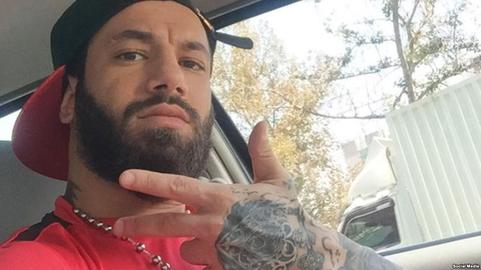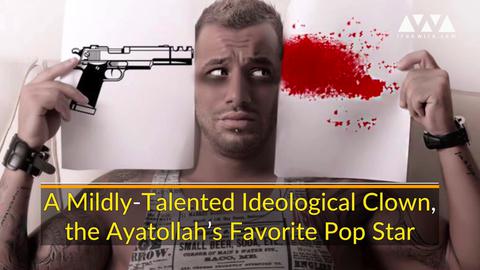Iranian singer Amir Tataloo has close to four million followers on Instagram.
That’s twice the number President Rouhani has.
He’s enjoyed fame, notoreity, and scandal. From underground rapper to football wannabe to champion of veteran causes and political commentator, Tataloo keeps re-inventing himself, taking risks and always hitting the headlines — though not always with the outcome he would have liked. Recently, he delved into the political maelstrom, leading some to question whether he could emerge unscathed. But Tataloo hasn’t let the defeat of Ebrahim Raeesi, President Rouhani’s main rival in this year’s presidential election, discourage him. After all, he’s still in favor with one of the most powerful institutions in Iran: The Revolutionary Guards Corps.
Tataloo, 33, whose real name is Amir-Hossein Maghsoudlou, is probably Iran’s most famous banned singer. Because his work draws on American music like R&B and rap — which conservative religious authorities regard as “immoral” — he is forced to perform in private, underground venues, often in the basements of people’s homes.
His fans — who the singer fondly refers to as "Tatalites — use a pigeon-like call to show their love for him, or to let him know that they support a cause he champions. When Tataloo says something, or someone says something about him, they are quick to respond, jumping online to make their voices heard. Last year, Tataloo was arrested on grounds of “encouraging the youth to engage in corruption and prostitution." Thousands rushed to his defense.
Tataloo and three of his friends formed the first Iranian “boy band” after the 1979 Islamic Revolution, Naturally, they were not allowed to perform in public. Tataloo released his first record in 2003. For a while, he lived in Dubai so that he could continue his musical activities in a less restrictive environment. When he returned to Iran, his popularity soared. His sensational lifestyle, tattoo-covered body, piercings and showy media persona soon catapulted him to stardom.
Repent and Prosper
In the three days following his arrest on August 23, 2016, 700,000 people went on to Tataloo’s Instagram page, calling for his release and protesting against the way he’d been treated. Authorities held Tataloo in detention for 62 days and then released him on bail. During the two months of his incarceration, his fans did not let up: Some of them even posted comments on Ayatollah Khamenei’s official websites, urging the Supreme Leader to let him go. When Tataloo was released, Tehran’s Prosecutor Abbas Jafari Dolatabadi said the rapper had “apologized” during his trial. According to media reports, he had that been sentenced to 10 years in prison and 74 lashes, although the sentences were not carried out.
If these reports are true, then that sentence was quite harsh. Because prior to the much-publicized arrest of 2016, Tataloo told the public he was a reformed character. In 2013, morality police briefly arrested Tataloo for cooperating with foreign satellite stations. He spent just two days in jail, but the moment he was out, he repented publicly. “I have to say that contrary to my innermost desire,” he wrote, “I made a record that many consider a bad record. I must account for it and I will be accountable for it.” But he also expressed his hope to have a future in Iran, and said that, “God willing,” he would be able to secure a performance permit and “ be able to work inside Iran.” Some people said his repentance was a cynical move to try to secure a permit, but if so, it failed. The permit never materialized.
A Football Star in his Own Mind
Two years after that, Tataloo took a fancy to football. In fact, he decided to play for the most celebrated Iranian team, Persepolis. Up to that moment his only contribution to football had been a song supporting Iran’s National Football Team at the 2014 FIFA World Cup entitled “I’m one of those 11.” Apparently, he believed the title of his own song, and a month or so after the World Cup, he paid an uninvited visit to Persepolis’ practice field, letting the team know he wanted to replace Ali Karimi, the club’s star player who had left in 2013. The team’s head coach Hamid Darakhshan ordered him off the field.
Tataloo then went on to Instagram and announced that he was going to play for another football team, but he never received any offers. He returned to music, but Tataloo was determined to expand his presence and secure a more far-reaching impact.
In 2015, when nuclear negotiations between Iran and the 5+1 group of countries was nearing its denouement, Tataloo “dropped a bomb,” as one media outlet put it. He published a music video that showed him standing on an the deck of the Iranian warship Damavand singing a song entitled “Nuclear Energy.” From the warship, he sang out the song’s controversial lyrics — “An armed Persian Gulf is our absolute right!” —with backup singers properly attired in Iranian Navy uniform. Some hardliner media, no friend to the negotiations, praised it.
But the Ministry of Culture and Islamic Guidance announced that it had not issued a permit for the production of such a video. Many Iranians were befuddled. How could an underground singer who was unable to secure a permit to perform live be allowed to sing on the deck of an Iranian Navy ship? Once again, Tataloo caused a storm online, though perhaps not in the way he had hoped. For days, thousands of Iranians expressed their anger and displeasure across social networks.
But Tataloo was not dissuaded from his new political path. He made a new video. This one was called “The Martyrs,” honing in on one of the country’s most emotive subjects: The 1980-1988 Iran-Iraq War. In September 2015, Tehran’s Museum of Peace, run by war veterans, celebrated the singer, anointing him as its “Ambassador for Peace.” By now he was no longer a singer who traded in western-tainted songs. He was a major celebrity.
When Tataloo decided to become a political commentator, it coincided with the rise of the Telegram app in Iran, which had become one of the country’s most popular social media platforms. Tataloo used his Telegram channel to write about politics, praise Ayatollah Khamenei, pay tribute to Ghasem Soleimani, the commander of Iran’s expeditionary Quds Force fighting in Iraq and Syria, and defend policies of the Islamic Republic in general. However, when pressed about his political pronouncements, Tataloo confessed he was not actually very informed about politics, and even admitted it was a friend with the Revolutionary Guards’ Intelligence Unit who wrote the singer's posts.
Given Tataloo’s controversial past, it seemed strange that Tataloo had such close links with the Guards’ Intelligence Unit. Since Hassan Rouhani was elected as president in 2013, the unit has taken on a particularly aggressive approach and appears to operate in line with the policies of ultra-conservatives, carrying out numerous arrests of journalists, civil rights activists, social media users, and even fashion models and designers. Why do they view Tataloo, a singer with a controversial past, so differently?
A Gift of 4 Million Votes?
The career of the “new Tataloo” reached a climax during the 2017 presidential campaign. He announced his support for presidential candidate Ebrahim Raeesi, the darling of the Revolutionary Guards and the hardliners and Rouhani’s most serious contender. On May 17, he met Raeesi personally. When the photo op and the video of the meeting between the two became public, it was a political sensation. Tataloo boasted that his four million Instagram followers would vote for Raeesi, and contribute decisively to his victory.
Of course, this did not happen. Raeesi was defeated by a wide margin, and many principlist conservatives even pointed the finger at Tataloo, accusing him of having offended the sensitivities of religious voters. For his part, Raeesi took his revenge on Telegram. He told the 290,000 subscribers to his channel that he was abandoning the app.
But the questions remained: How was it that this former underground singer who had done time for spreading corruption and prostitution got to meet the hardliners’ presidential candidate? While he has endured criticism from the conservative camp, many still insist that he has repented and is leading a new life. In mid-July, he was invited to a ceremony presented by Fars News Agency, an affiliate of the Revolutionary Guards, where he was welcomed with praise.
Over the last four years, Tataloo has also turned, little by little, into an extreme defender of one of the conservative's most important issues: Mandatory hijab. In early July, when news emerged that seven-year-old Atena Aslani had been sexually abused and murdered in Ardabil, Tataloo blamed the parents for failing to protect their daughter by making her wear proper hijab. The mourning parents have promised to lodge a legal complaint against him.
It is not clear what, if anything, the court will do. What does seem clear is that Amir Tataloo has found a home within some of Iran’s most vociferous and extreme conservative camps. Soon he may well realize his dream of staging concerts in public, especially now that he has the Revolutionary Guards as allies. In fact, he could plan his boldest move yet. Perhaps a rap concert for the supreme leader?
visit the accountability section
In this section of Iran Wire, you can contact the officials and launch your campaign for various problems



























comments